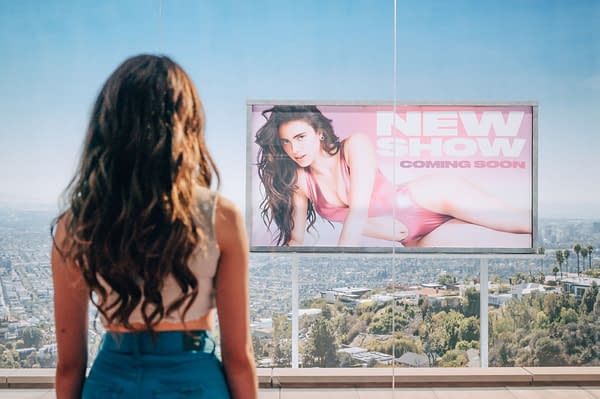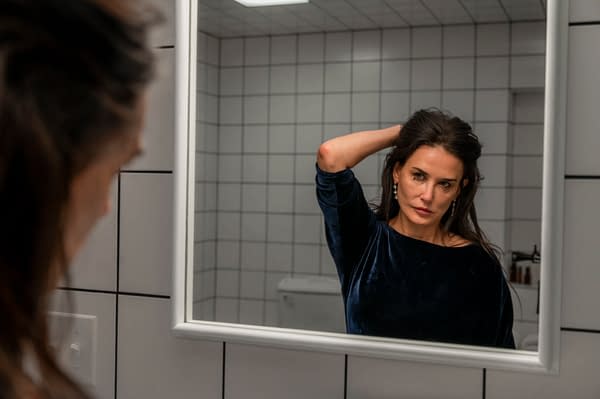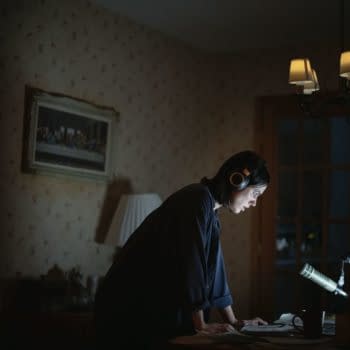Posted in: Movies, Review | Tagged:
The Substance Review: French Cinema's Hollywood Hit Piece
The Substance is, ironically, mostly style with very little substance that isn't there for the shock value or visceral reaction.
Article Summary
- French film "The Substance" struggles with heavy-handed Hollywood criticism and pacing.
- Mixes French cinema style with dated "youth and vanity" message.
- Character motivations lack depth and coherence, hindering engagement.
- Potential missed for deeper social commentary beyond shallow shock value.
The Substance is billed as a horror film, though nothing about it is scary or particularly indicative of the genre. It feels like it has more in common with the Blood Diner 1980s "campy horror" genre than it does anything modern, which could be a good thing. That said, it might have behooved The Substance to lean more into psychological horror and rely less on "gross-out" tactics in regard to both gore and food.
For starters, this is a French film. The style, pacing, actual mechanics, and story are told in a classic French cinema style, which comes as no surprise given that it's a Coralie Fargeat film. However, there does feel like a bit of a disconnect between the strong French cinema style and the story of Hollywood, which takes some of the bite away from the point the film is trying to make.
The Substance's central message is that Hollywood and the media industry glorify youth and vanity over everything else. For a film that clocks in at nearly two and a half hours, it needs to say more or say what it's saying in more of a dynamic way. It feels very heavy-handed, and the point of "Hollywood discards you once you hit an age limit" was already hammered home in the first 20 minutes. It feels about an hour and a half too long, and even then, for a film that lacks subtlety, it feels like a slog to watch.
The Substance Is All Style And No Substance
The characters' motivations often feel completely unmotivated and divorced from any sense of logic, especially Sue (Margaret Qualley), who appears to have zero discernible personality beyond being young, hot, and selfish. Conversely, Elisabeth's (Demi Moore) characterizations largely revolve around moping about not being considered young and hot anymore and losing her show, which feels out of touch in the age of "create your own media," especially for an established star like her. It's stylized to specifically not show where it's set in nor modern technology, which could forgive the attitude if it were set 15 years ago, but even then, it reads poorly for modern audiences. The "starlet aging out of Hollywood and into obscurity" narrative feels like it hasn't been relevant since the 1960s.
Art, cinema especially, is subjective and open to individual interpretation; however, The Substance has so much potential to say more than it does: choices in your youth are a direct reflection of how you fare later in life, a cautionary tale about the dangers of the lure of Hollywood and fame, or even making a statement about depression and isolation. In a way, all of these can be messages gleaned from the film, but none are what the film is about or the main message.
- The Substance Still. Credit: Mubi
- The Substance Still. Credit: Mubi
- The Substance Still. Credit: Mubi
- The Substance Still. Credit: Mubi
The Substance clearly vilifies the male Hollywood executives and those who worship women for youth and spurn Elisabeth for aging, upholding the youthful beauty standard. It's a feminist take while somehow feeling like it was made for the male gaze, though that style is very French. If this were toned down or taken out nearly entirely, the film would be stronger – the male nurse who initially told Elisabeth about the Substance seemed more interesting of a character than anyone else in the movie, and even he was villain-coded.
What's most disheartening is that this film was "impossible" to make anywhere outside of France, especially in LA and Hollywood, the film's only setting, to the point that the city feels like a character in itself. At a time when productions are fleeing from Southern California, leaving the industry in Los Angeles a shell of what it once was, it feels tone-deaf, to say the least.
Overall, The Substance is, ironically, mostly style with very little substance that isn't there for the shock value or visceral reaction. There is little horror in the premise, and the body horror wasn't particularly scary, nor did it help to make the film's point in non-repetitive ways. The message feels dated, and the ending was the most "horror" part of the whole film, and even then, it can be read as campy, bordering on laughable.




















